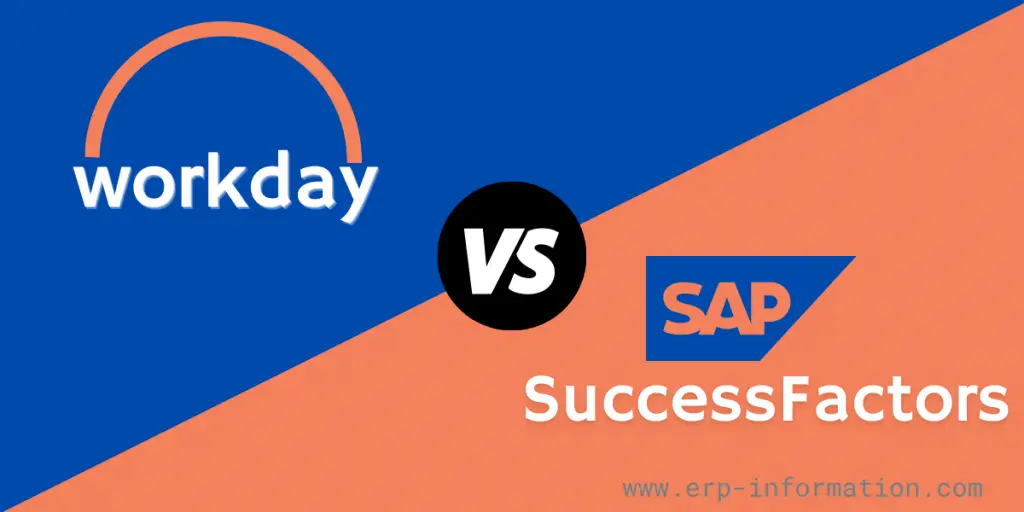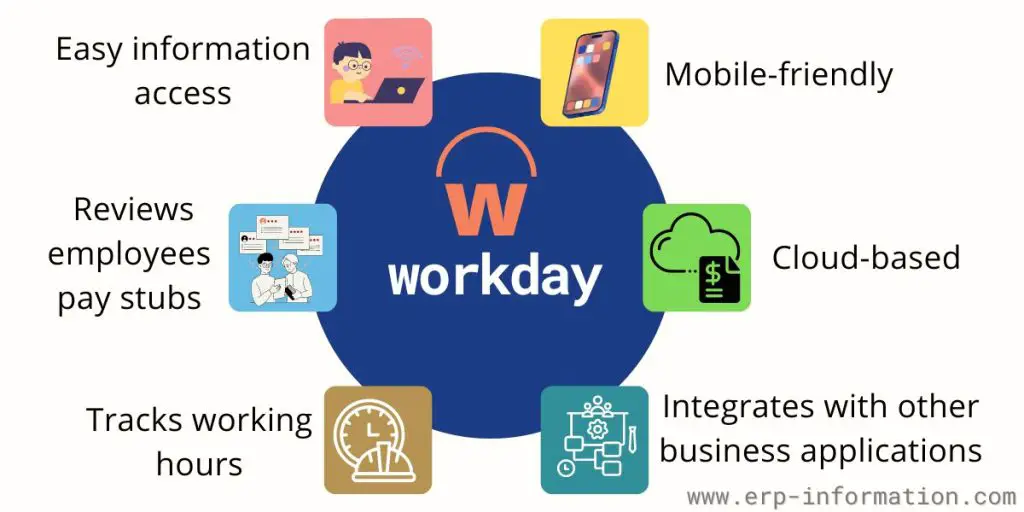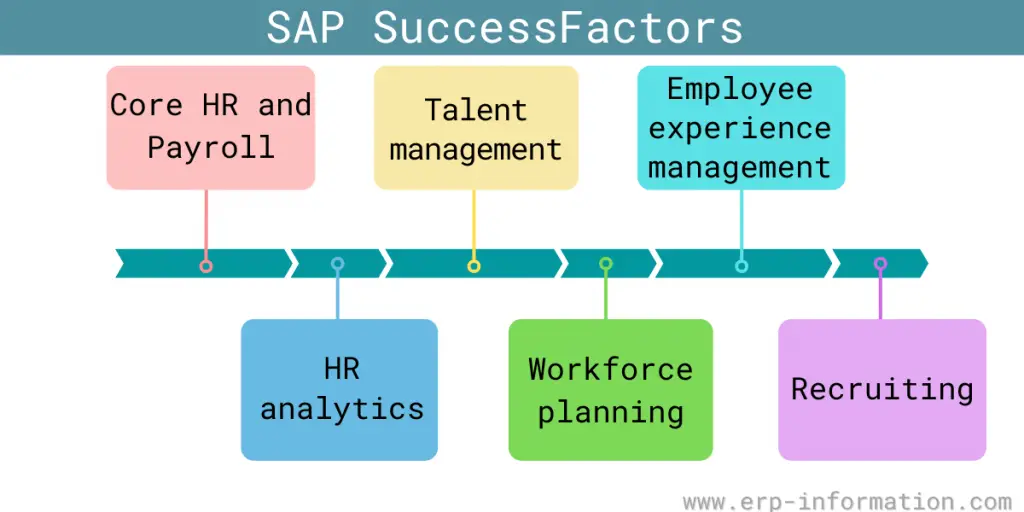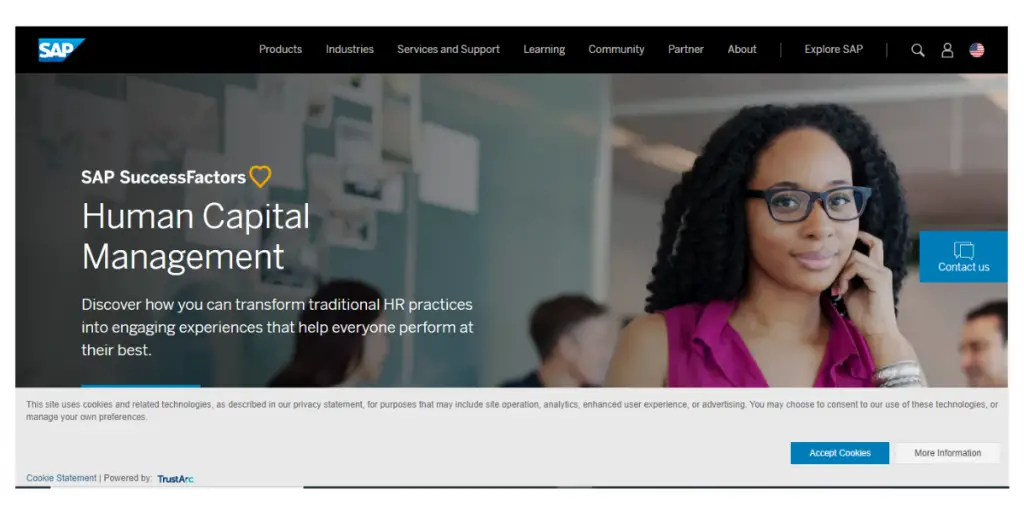Here we start to discuss Workday vs SuccessFactors. Enterprise organizations seeking to implement human capital management (HCM) solutions must compare Workday with SAP SuccessFactors.
Workday and SuccessFactors lead the pack in HCM applications, but they take different approaches to solving HCM challenges.
This blog post will compare Workday and SuccessFactors in terms of their cost, market share, consultant training, and other key differences such as features, target market, implementation time, user interface, customer support, deployment, etc. By the end of this post, you should have a better idea of which one is the right fit for your needs.
What is Workday?
Workday is a leading provider of cloud-based enterprise software solutions for human resources and finance. The company was founded in 2005, and its products are used by over 2,700 organizations worldwide.
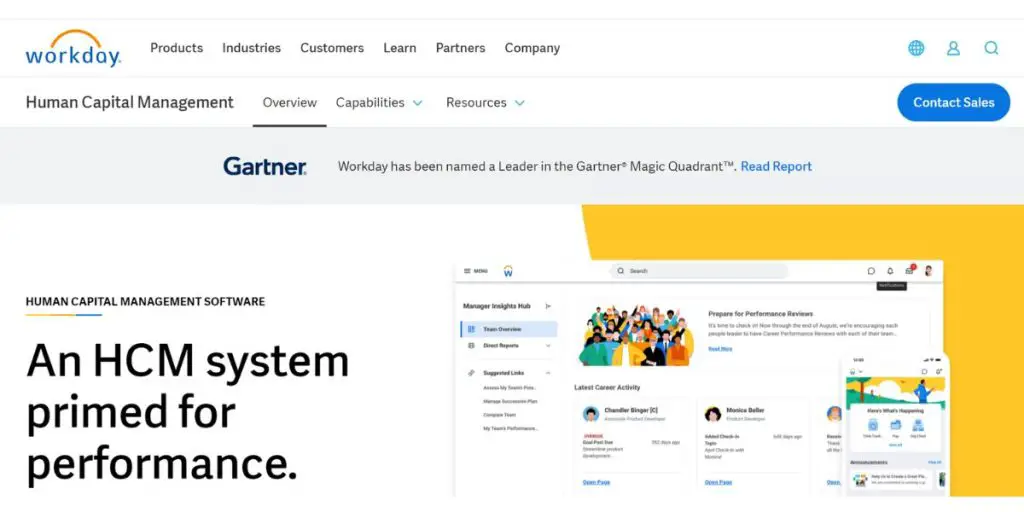
Workday cloud HCM was designed with the modern workforce in mind. It’s mobile-friendly, cloud-based, and integrates with other business applications.
That makes it easy for employees to track their hours worked, review their pay stubs, and access their benefits information on the go.
Workday HCM stands out as a comprehensive solution that goes beyond traditional human capital management. It leverages cutting-edge technologies, such as machine learning and augmented analytics, to drive workforce agility, engagement, and productivity while offering flexibility in rewards planning and addressing the specific needs of frontline workers.
What is SAP SuccessFactors?
SAP SuccessFactors is cloud-based human capital management (HCM) software that operates based on a Software as a Service model (SaaS).
This management suite is designed to help businesses manage their employee data, engagement, and talent. The company was founded in 2001 and has over 37 million users in over 190 countries.
The SuccessFactors management suites include modules for core HR functions such as benefits, payroll, time and attendance tracking, and compliance.
Additionally, the SuccessFactors platform offers modules for more strategic HR initiatives such as performance management, succession planning, and recruiting.
Let us start comparing.
Workday vs SuccessFactors: Pricing
Similar to many software solutions, both Workday and SAP SuccessFactors keep their pricing details confidential. Furthermore, neither company provides trials or free versions of their software.
To obtain a detailed quote, prospective customers need to contact the sales departments of the respective companies. The quote will be tailored based on factors such as the number of employees, required modules, software implementation needs, and any necessary advisory services.
Workday vs SuccessFactors: Costs
| Costs | Workday | SuccessFactors |
| Initial Costs | Utilizes a subscription-based pricing model, which may result in lower initial costs but includes recurring fees. | Licensing fees can differ depending on the selected modules. As an SAP product, it may offer bundled deals for existing SAP customers. |
| Implementation Costs | Generally has more predictable implementation costs due to its unified, cloud-based structure. | Costs vary based on the level of customization and integration required with other SAP products. |
| Maintenance Costs | Automatic updates help minimize the need for manual management. So maintenance costs will be low. | Regular updates may necessitate manual intervention, especially if the system is heavily customized. |
| Training Costs | The intuitive design can potentially lower training expenses. | Its traditional interface might necessitate more extensive training. |
According to analysts, Workday is the Human Capital Management (HCM) market leader, 24.4% share. Meanwhile, SuccessFactors has a 21.9% share of the HCM market.
However, in the overall Talent Management System (TMS) market, SuccessFactors has a larger share with 28%, compared to Workday’s 20%.
So what explains these different shares? A big part of it has to do with each company’s focus. For example, Workday started as an HR management software provider and only later added talent management features.
So for them, HCM is still their core business. On the other hand, SuccessFactors was always focused on talent management and only later added HR management features. So for them, TMS is still their core business.
Consultant Training of Workday vs SuccessFactors
Organizations are increasingly turning to cloud-based solutions for their HR needs, and two of the most popular platforms are SuccessFactors and Workday.
Both offer training programs for consultants who want to help implement and support these systems, but the two approaches have some key differences.
SuccessFactors is a subsidiary of SAP, and its consultant training program reflects that heritage. However, it tends to be more traditional in structure and content, focusing on classroom learning and expert lectures.
There is also an emphasis on practical experience, with consultant trainees working on projects during the program.
On the other hand, Workday takes a more hands-on approach to its training program. Trainees work directly in the Workday system from the start, learning how to configure and use it to solve real-world problems.
The program also includes a vital element of mentorship, with experienced consultants working closely with trainees to provide guidance and feedback.
Key Comparison of Workday and SuccessFactors
| Workday | SuccessFactors | |
| HCM Features | Human Resource Management, Payroll, Employee Experience, Talent Management, Workforce Planning, Analytics & Reporting | Core HR and Payroll, Talent Management, Employee Experience Management, HR Analytics, and Workforce Planning |
| Origin | Initially, it was fully HR-centric and then developed talent management | It started as talent management and then developed other HR features |
| Subscription cost | Module-based model | Per User, Per month model |
| Target market | Small to midsize businesses | Larger enterprises |
| Implementation | It as a cloud-based solution, is designed for swift and straightforward implementation. It can take as little as two weeks. | It is a more intricate system, necessitating extensive customization and a more involved implementation process. It can take up to six months to implement. |
| Customizations | Workday HCM is highly configurable, enabling businesses to adapt the software to their specific requirements. | SAP SuccessFactors comes with a broad array of pre-built features and modules, which may offer less flexibility for customization |
| User interface | It provides a modern interface, hence it is simple and ease to use. | It provides a modern interface, hence it is simple and easy to use. |
| Support | Offers 24/7 support | Limited support outside of business hours |
| Deployment | On-premise or in the cloud | Only available as a cloud-based solution |
| Integration | Offers native integration with various third-party applications | Offers limited integration options |
| Reporting | Robust reporting capabilities | Limited reporting options |
Gartner Reviews
Gartner peer insights reviews compared Workday vs SuccessFactors in talent management, core HR, and enterprise HCM.
In the subjective opinions of individuals, they found that Workday performed better overall, with particular strengths in performance management and succession planning.
SuccessFactors did have some advantages in the area of recruiting. However, Workday and SuccessFactors offer great functionality and are suitable for large organizations.
Features Differences Between Workday and SuccessFactors
| Features | Workday | SuccessFactors |
| Human resource management | HRIS makes it easy for HR professionals and staff members to access the needed features. With its intuitive dashboard, busy HR reps can keep up with data-driven insights while empowering team members through a convenient self-service portal. | With this, HR professionals enjoy a tailored experience with personalized dashboards and easy access to their data – all at their fingertips. In addition, they can quickly make edits to maximize productivity through web or mobile app connectivity. |
| Payroll management | It lets users run payroll in more than 40 countries. It offers ways to see your payment information in real-time and notifies you if something is wrong with your payment. | This software has things to help individuals with their work goals and get better at their jobs. |
| Compliance | Workday’s compliance features have security aspects like data encryption and visibility permissions. | This feature is outside salesforce, but SuccessFactors collects staff employment information that is needed based on local regulations and what is considered the best way to do business in that area. The information is displayed based on local customs. |
| Learning and development | This software has things to help individuals with their work goals and get better at their job. | This software has educational resources to help people learn more and get promoted. |
| Benefits administration | It supports various plans like health, wellness, flex, and retirement. Tools like the ACA dashboard help manage coverage and regulatory changes. Integrates with numerous providers for seamless data flow and reduced administrative burden. | SuccessFactors offers customizable benefits management with a self-service portal for employees. It ensures regulatory compliance and includes decision-support tools to help optimize benefits offerings. It also integrates with third-party providers to enhance efficiency and streamline benefits management. |
| Workforce planning | Workday’s workforce planning tools utilize the Adaptive Insights Business Planning Cloud to facilitate modeling, scenario planning, and collaboration. This integration helps create strategic hiring plans and ensures data accuracy for forecasting. | SuccessFactors provides integrated workforce planning features that connect with talent management and core HR modules. This allows for strategic scenario modeling, alignment with business goals, and cost optimization through real-time analytics and forecasting tools. |
| Talent management | Workday offers extensive talent management features, including onboarding, career development, goal setting, performance reviews, and succession planning. The system uses machine learning to identify talent gaps and retention risks, integrating seamlessly with other HR functions for a cohesive experience. | SuccessFactors delivers a comprehensive talent management suite encompassing recruiting, onboarding, learning and development, performance management, and succession planning. AI-driven tools enhance talent acquisition and development, ensuring a personalized and effective talent management process. |
FAQs
What is the purpose of the Workday?
Workday serves as a unified platform that seamlessly integrates actionable, real-time analytics, offering organizations a comprehensive view of their business encompassing financials and workforce data.
This embedded analytics feature enables users to securely access insights instantly, fostering collaboration and facilitating prompt decision-making—all within the Workday environment.
By providing a centralized hub for critical business information, Workday enhances efficiency and empowers users to take informed actions without the need to navigate away from the platform.
Conclusion
The best way to decide between Workday and SuccessFactors is to assess your needs and see which platform offers the features you’re looking for.
Workday HCM is a good solution for companies that operate in multiple Western countries and need detailed reports and visualizations of their data. Workday is the better choice for small to midsize businesses that need an all-in-one solution that includes payroll, HR, and benefits.
If you do business in many different countries, you should use SAP SuccessFactors. SuccessFactors is the better choice for larger enterprises that need a comprehensive HR solution to help with talent management and performance evaluations.
Workday might look nicer, but SAP SuccessFactors can do more and work in many countries.
